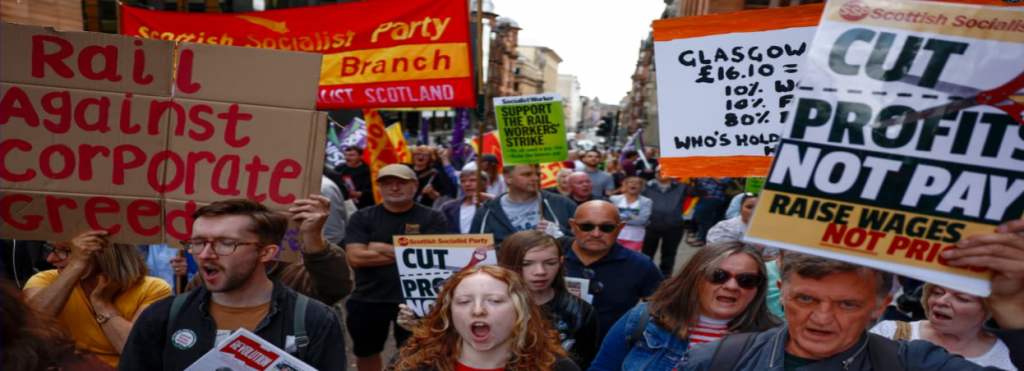This is a guest post by Patrick Whittam, one of our undergraduate students of behavioural economics. If you wish to contact Patrick e.g. about internship opportunities etc. then please email david.comerford@stir.ac.uk and I will pass along your message.

During December of 2022, I was forced to take a taxi instead of taking my normal train journey, due to the train strikes. While in the taxi, I engaged with the typical taxi driver-passenger conversation. Our conversation moved onto the subject of the rail workers taking industrial action and it is fair to say that my driver was critical of their decision. His complaints went along the lines of: ‘Why are those train drivers striking? What do they actually do? They just press a couple of buttons. If anyone deserves a pay rise it should be me!’
The main reason to explain why many people have been striking in the UK over the past year is simply that inflation is high and workers want a pay rise in line with inflation. There are hundreds of specific reasons like this to explain why people strike, however there are other subconscious factors which could contribute to people’s decision of whether to strike on not. These factors include: social contagion (people are more likely to do something if others are doing it), cognitive interferential processes (striking is more likely to occur if the reason requires little subjective interpretation e.g., a pay dispute or breaking of an agreement) and the factor this blog will explore – the self enhancement motive. The self enhancement motive is the idea that we tend to disregard information which paints us in a negative light. Even if the information is truthful, we often prioritise feeling good about ourselves and maintaining a positive self-esteem over gaining an accurate evaluation of ourselves. One example of this is the above-average effect. The above-average effect was demonstrated in a study by Svenson in 1981, in which he asked participants if they believed their driving ability was better than the average driver.
Logically, we would expect around half of drivers to report that they are better at driving than the average driver, however around 90% of people believed their driving ability was above average.
Additionally, people tend to overestimate their own efforts and their own contributions. For example, if you ask individuals in a relationship what percentage of the housework they do, their combined percentage will usually be greater than 100%.
One explanation of this is selective memory. We tend to remember positive contributions we make whilst forgetting mistakes we have made, as well as forgetting the positive contribution of others. Again, this is a subconscious mechanism and is therefore out of our control. We don’t tend to have a choice in what we remember or what we forget.
One way which people demonstrate the self enhancement motive, attempting to maintain a positive self-esteem is by making downward social comparison. Like the name suggests, downward social comparisons are when we look down on others and compare ourselves to people in ‘worse’ situations. Therefore, a worker in one industry may look at workers in another industry and think ‘at least I am more qualified, skilled, and better paid than the workers in that industry.’ This can have the positive effect of making us feel better about ourselves but can make us less empathetic and be seen as cruel.
Applying these principles to workers, it is clear to see how this could stimulate a motive to strike. Taking the example of the taxi driver from my previous anecdote, if we were to ask him questions such as: ‘Do you think you work harder than the average person?’ Do you think you are better than the average taxi driver?’ Do you think you are more worthy of a pay rise than the rail workers and if so why?’ it would be interesting to see if he would answer ‘Yes’ to these questions, theoretically displaying the above average effect and downwards social comparisons*. Therefore, as the RMT have recently voted to accept the network rail offer of a deal worth a 9% pay increase over two years, workers in other industries could be influenced by the self-enhancement motive and see themselves as more worthy of a pay rise, spurring them on to consider taking industrial action.
Given the amount of industrial unrest in recent times and the length of time it’s taken to resolve this unrest, perhaps greater consideration of the self enhancement motive could result in changes to try and reduce industrial disputes or at least resolve them sooner.
* of course, answering yes to all these questions will be accurate for some taxi drivers but logically if the first two questions were answered yes by more than half of all taxi drivers, the responses would often be inaccurate.